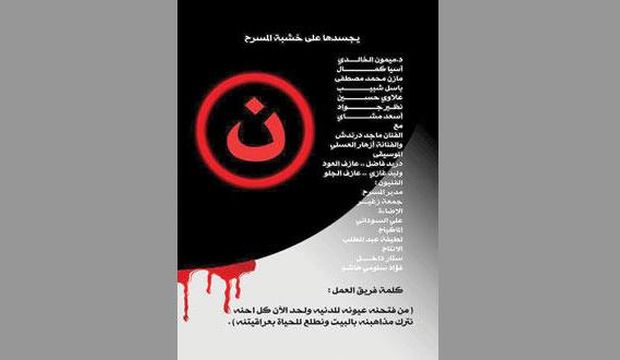Baghdad, Asharq Al-Awsat—Iraqi actors are expressing their solidarity with the country’s persecuted minority groups in a new play, titled N—or “Nun,” the initial letter of the Arabic word for Christians, Nasara, which the Islamic State of Iraq and Syria (ISIS) painted on the houses of Mosul’s Christians to mark them out.
This branding of Christian homes and the subsequent expulsion of the Christian population from the city sparked an international outcry, with people using the #WeAreN hashtag on social media websites such as Twitter to mark their solidarity.
N was performed in Baghdad on Monday as part of the Solidarity Festival held in support of those who have suffered mass killings and displacement at the hands of ISIS.
The festival is organized by the Iraqi Ministry of Oil, and N was performed at the Ministry’s headquarters in the heart of the capital.
Assem Jihad, the man behind the idea for the production, told Asharq Al-Awsat that the play was “the first local drama to stand up to terrorism and is reflective of a strong stand in support of the minorities and ethnic groups that encountered killings, forced migration and displacement. The play reflects the displaced families’ sufferings and the ugly face of ISIS’ gangs as well as that of terrorism in general.”
Actor Asia Kamal said: “I found that such a work of art will enable us to show support to the families that faced death and tyranny, and it will convey a message to the international community about the Iraqi people’s sufferings and the dangers and atrocities they face.”
Co-star Mazen Mostafa said the play is an attempt to show the sufferings of all the different ethnic and religious communities.
Christians in Mosul were given an ultimatum that expired on July 19: convert to Islam, pay a religious levy in accordance with Shari’a, or face death. The Christians who refused to convert or pay the protection tax were also given the choice to depart the city forever. Most of the Christian families chose to flee their homes.
Jihad explains that “the context of the drama . . . reflects Iraq’s unified stand against terrorism, and explicitly highlights the challenges our people are facing.”
The script is drawn from the real-life stories of displaced ethnic and religious groups and the attempts made to bury their heritage.
Jihad hopes the play will be performed beyond the Ministry of Oil’s corridors to reach those it portrays.
Director Qazem Nassar said: “The play is a cry in protest against the displacement of hundreds of thousands of Iraqi families who used to live in Mosul, Sinjar, Salah Al-Din, Tal Afar, Tuz Khurmato, Al-Sa’adia, Jalawla, Zammar and elsewhere who all had to flee their homes to escape the tyranny of the criminal ISIS gangs.”
He added: “All actors in the play have interacted closely with the script and played their roles professionally and wonderfully due to their absolute faith in Iraq’s war on ISIS in general, and their solidarity with the displaced in particular.”

